
You are reading:

You are reading:

Emma was 32 when her partner tried to kill her by stabbing her 27 times. She woke up in intensive care and survived, but the attack left an indelible psychological mark, as well as physical consequences that made it very difficult to find a job to support herself and her son. Thanks to COCEMFE Navarra and the Incorpora programme of the ”la Caixa” Foundation, she now teaches young people what gender violence is and what it means.
“We have to take the plunge! You have to have a good head, of course, and a solid, constructive foundation in life, but you have to go for it! If you go through life with a raincoat, you’ll protect yourself from the bad stuff, but you’ll miss all the good stuff too!” This is what Emma tells the boys and girls who take part in the Invisibles talks, sessions in which she talks about situations that make us uncomfortable: disability, violence, discrimination. But also, and above all, she promotes attitudes to face up to them: empathy, respect, commitment, confidence, enthusiasm. Emma knows what she’s talking about. Her long-term partner tried to kill her. For several days, her life hung in the balance. But it was not her time, and Emma defied fate. Now she’s writing her own destiny, with unshakeable energy and purpose.
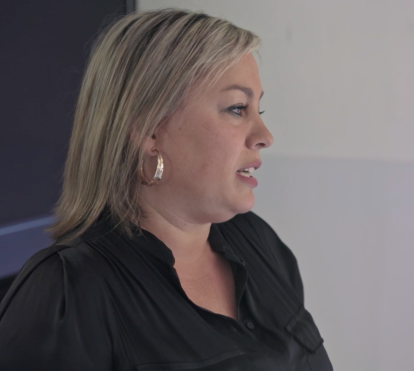
As a result of the violent assault, Emma’s mobility in her arms was impaired. In addition to her disability, she had to face the problem of working. She had to constantly justify herself in interviews, which re-victimised her. Emma had moved to Pamplona after the attempt on her life and heard about COCEMFE Navarra, an organisation that works for an inclusive society that guarantees full exercise of the rights of people with physical and organic disabilities. It was there that she met Iranzu, one of COCEMFE’s employment technicians, and a process of empowerment began between the two of them, and a future full of achievements for Emma.
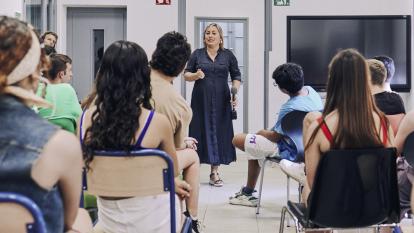
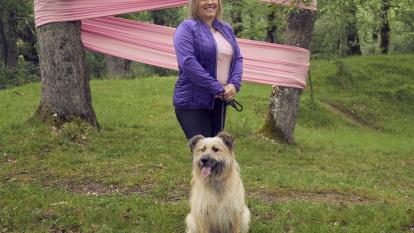
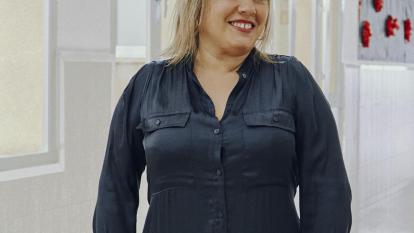
“I walked in and said to myself, ‘Wow, what efficient women. I think this is where I’ll find a way to make a living,’” Emma recalls. Because the first thing she had to sort out was work, ensuring she had an income to support herself and her son. “When you have your material needs covered, your anxiety decreases and you can start giving to others.” Emma took part in the ”la Caixa” Foundation’s Incorpora programme, which provides support to people facing difficulties entering the labour market.
“There are people who have accepted their disability and already have some tools, and know exactly what they want,” says Iranzu. "But there are others who need more support.” This is especially true when there has been abuse, as in Emma’s case, where not only the person’s physical integrity but also their moral and emotional integrity has been severely damaged. That’s why the Incorpora programme promotes initiatives to help these women find employment, such as workshops to improve their self-esteem. “Being part of this process of personal growth is very exciting and inspiring,” says Iranzu. “They think they have no potential, but they actually offer added value to companies because they’ve been through very difficult situations and have been able to move forward.” This was the case with Emma, who started working for an insurance company. “They told me there were CVs that were academically better than mine, but I had an irresistible attitude and light.”
Emma worked at the insurance company for six years until last year, when she took a leave of absence to dedicate herself wholeheartedly to Invisibles, because she felt she had to put a face on gender-based violence and reach out to young people. The project has already visited numerous secondary schools, shelters and children’s centres throughout Spain. “And it continues to grow thanks to the contributions and needs of the people who share the space with me.” A strong connection is established with the participants, who often start the session looking at her with anger or contempt, but end up hugging her and confiding their doubts and fears in her.
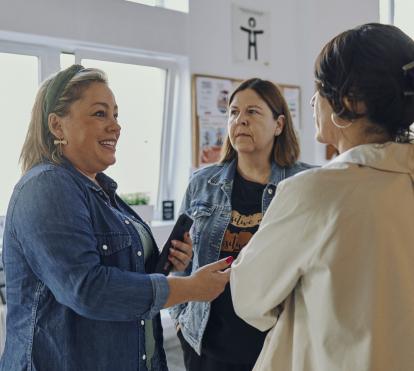
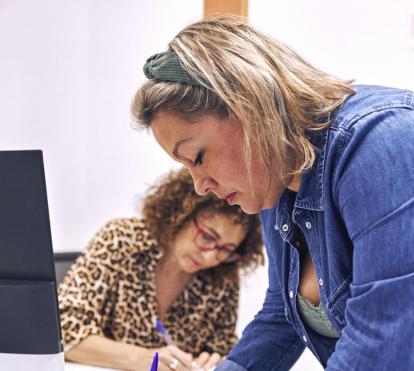
“We saw you with such enthusiasm and strength, and we couldn’t do anything but support you,” Iranzu interjects. “You’re a role model for the people who come to the service.” Emma, strong and emotional, which no one should believe are incompatible attributes, embraces Iranzu. “Well, don’t think I wake up every day as happy as a lark. It’s just that I let out what’s inside me and dare to project beautiful things.” And she concludes: “Life’s about falling down and getting back up again. Sometimes you need just a little push, other times more.”
Emma’s experience is part of the Life stories documentary project. It consists of 14 accounts of overcoming adversity that give a voice to people at risk of exclusion who share what they’ve learned to raise public awareness.